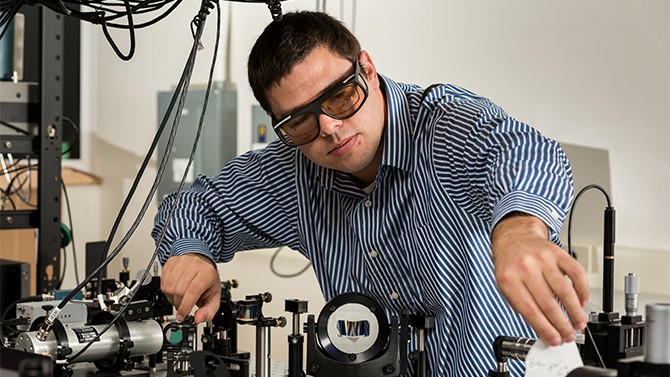Feser’s research to focus on engineering of materials with improved thermal properties
At a microscopic level, heat flow in many materials occurs through random vibrations, called phonons, that transport energy in a wave-like manner.
Recently, Joe Feser, assistant professor of mechanical engineering at the University of Delaware, received a National Science Foundation Faculty Early Career Development Award to explore the physics of thermal energy transport in materials with embedded nanoparticles. The five-year, $500,000 grant will enable research on how to manipulate heat transfer by phonons, using embedded nanoparticles.
“Phonons interact with any impurities they encounter, including particles, leading to energy scattering that impedes the flow of heat,” Feser explains. “Our goal is to leverage new theoretical, computational, and experimental techniques to understand how phonons interact with nanoparticles and to use that information to engineer materials with improved thermal properties.”
The scientific findings from the project could lead to nanostructured electronic and optical materials with improved heat dissipation capabilities as well as to thermoelectric materials that directly convert heat to electricity and vice versa with unprecedented efficiency.
Thermoelectric materials, which generate electrical energy from a heat source or remove heat when an electric current is passed through them, are seeing increased use in a variety of power generation and cooling applications.
One particular advantage of these materials is that they can convert waste heat — from, for example, solar radiation, automotive exhaust, and industrial processes — to electricity.
Feser will explores two scientific hypotheses in the NSF project.
“The first is that a phenomenon known as Mie scattering is far more important to transport than previously recognized, and this changes the geometric and materials design rules for thermal control of nanocomposites,” he says.
“We’re also keen to understand whether localization governs the physics of long-wavelength phonons important to thermal transport in dense nanoparticle-in-alloy materials, and whether that can be exploited to create materials with extraordinary insulating properties.”
In addition to research, the project includes two educational outreach programs, one for at-risk K-8 children in Wilmington, Delaware, and the other targeted to industrial users with the goal of transferring ultrafast thermal measurement technology to nonacademic end users.
The grant was awarded through NSF’s Division of Chemical, Bioengineering, Environmental, and Transport Systems.
About the researcher
Joe Feser received his bachelor’s and master’s degrees in mechanical engineering at the University of Delaware in 2003 and 2005, respectively, and his doctorate from the University of California, Berkeley, in 2010. He served as a postdoctoral researcher at the University of Illinois, Urbana-Champaign from 2011-13 and then joined the UD faculty.
Feser leads the Microscale Thermal Transport Lab (MuTT Lab) at UD, which focuses on developing tools to study microscale thermal transport phenomena, new materials that push the limits of achievable transport properties, and new device technologies based on these materials.
Application areas include the cooling of electronic devices, energy efficiency, thermoelectric energy conversion, and next-generation magnetic recording devices.


